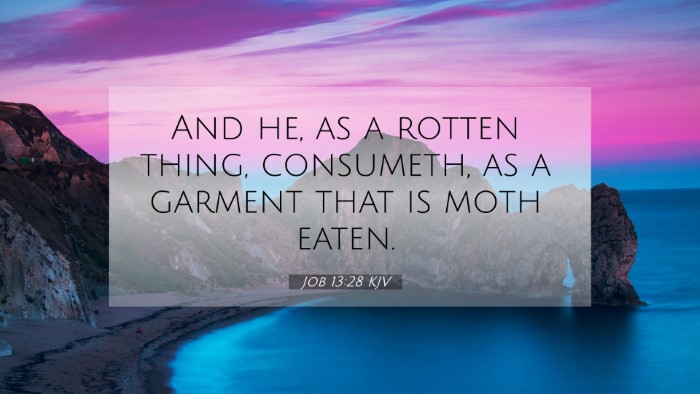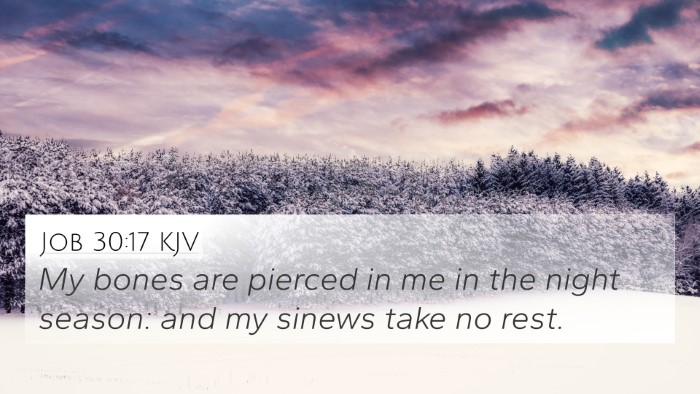Old Testament
Genesis Exodus Leviticus Numbers Deuteronomy Joshua Judges Ruth 1 Samuel 2 Samuel 1 Kings 2 Kings 1 Chronicles 2 Chronicles Ezra Nehemiah Esther Job Psalms Proverbs Ecclesiastes Song of Solomon Isaiah Jeremiah Lamentations Ezekiel Daniel Hosea Joel Amos Obadiah Jonah Micah Nahum Habakkuk Zephaniah Haggai Zechariah MalachiJob 13:28 Similar Verses
Job 13:28 Cross References
And he, as a rotten thing, consumeth, as a garment that is moth eaten.
Uncover the Rich Themes and Topics of This Bible Verse
Listed below are the Bible themes associated with Job 13:28. We invite you to explore each theme to gain deeper insights into the Scriptures.
Job 13:28 Cross Reference Verses
This section features a detailed cross-reference designed to enrich your understanding of the Scriptures. Below, you will find carefully selected verses that echo the themes and teachings related to Job 13:28 KJV. Click on any image to explore detailed analyses of related Bible verses and uncover deeper theological insights.
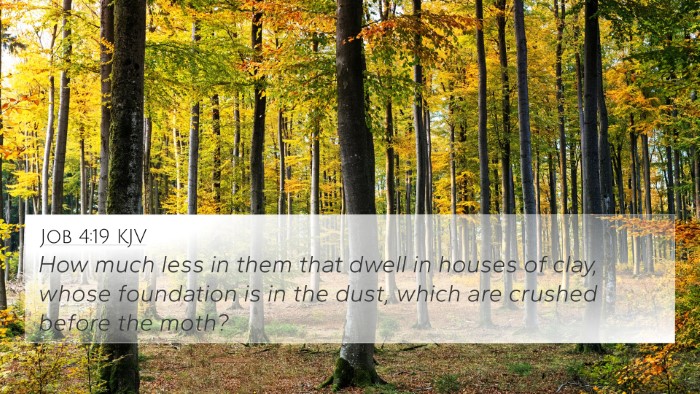
Job 4:19 (KJV) »
How much less in them that dwell in houses of clay, whose foundation is in the dust, which are crushed before the moth?

Psalms 39:11 (KJV) »
When thou with rebukes dost correct man for iniquity, thou makest his beauty to consume away like a moth: surely every man is vanity. Selah.
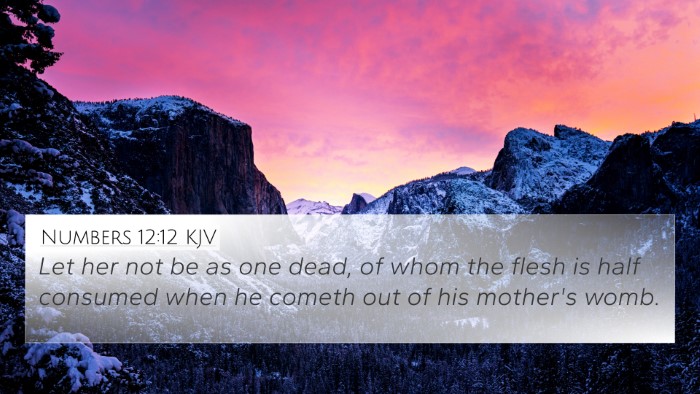
Numbers 12:12 (KJV) »
Let her not be as one dead, of whom the flesh is half consumed when he cometh out of his mother's womb.
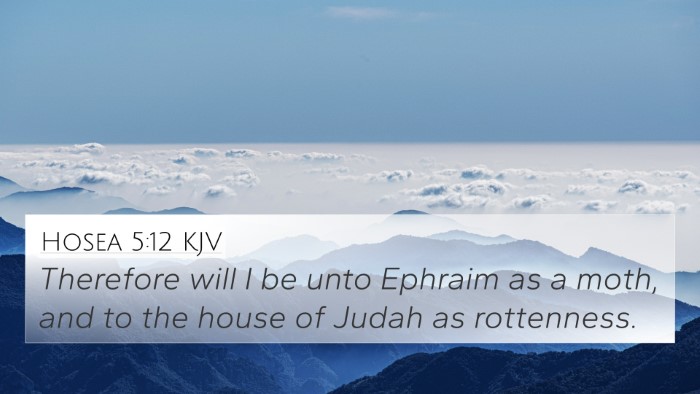
Hosea 5:12 (KJV) »
Therefore will I be unto Ephraim as a moth, and to the house of Judah as rottenness.
Job 13:28 Verse Analysis and Similar Verses
Understanding Job 13:28
Job 13:28 states, "So man wasteth away: yet he openeth not his mouth." This verse presents a profound reflection on human existence and suffering. Below, we will explore the significance of this verse through insights from public domain commentaries, complemented by an analysis of its connections with other Bible verses.
Summary of Job 13:28
This verse captures Job's lamentation over the fragility of human life. He acknowledges the inevitability of decay and death, emphasizing the silence of man in the face of his mortality. As Job reflects on his suffering, he conveys a sense of resignation and contemplation regarding the human condition.
Commentary Insights
- Matthew Henry's Commentary: Henry explains that Job is expressing the reality of human frailty. He notes that despite the physical decline and inevitable death, humanity often remains silent, reflecting a deeper philosophical contemplation on life and suffering. Human beings, like clay, are subject to the whims of their Creator.
- Albert Barnes' Notes: Barnes emphasizes the theme of decay, stating that Job articulates a universal truth: all men face mortality. He suggests that the verse illustrates a contrast between the lively spirit and the declining body, highlighting the struggle between the two. This inner conflict mirrors the human pursuit for meaning amidst suffering.
- Adam Clarke's Commentary: Clarke adds that Job's statement about man wasting away signifies the inevitability of death. He draws parallels to the fleeting nature of life, urging readers to consider the transient nature of worldly existence and the pursuit of a higher understanding.
Cross-References Related to Job 13:28
To deepen our understanding, the following Bible verses provide related themes or insights that connect with Job 13:28:
- Ecclesiastes 12:7: "Then shall the dust return to the earth as it was: and the spirit shall return unto God who gave it." This verse emphasizes the return to dust, paralleling Job's contemplation of human decay.
- Psalm 39:4-5: "Lord, make me to know mine end, and the measure of my days, what it is; that I may know how frail I am. Behold, thou hast made my days as a handbreadth; and mine age is as nothing before thee: verily every man at his best state is altogether vanity." Here, the psalmist reflects on human brevity and fragility, echoing Job’s sentiments.
- James 4:14: "Whereas ye know not what shall be on the morrow. For what is your life? It is even a vapor, that appeareth for a little time, and then vanisheth away." This verse highlights the fleeting nature of life, similar to Job's understanding of decay.
- 1 Peter 1:24: "For all flesh is as grass, and all the glory of man as the flower of grass. The grass withereth, and the flower thereof falleth away." This verse reiterates the theme of mortality and the impermanence of human glory.
- Isaiah 40:6-8: "The voice said, Cry. And he said, What shall I cry? All flesh is grass, and all the goodliness thereof is as the flower of the field... the grass withereth, the flower fadeth: but the word of our God shall stand forever." This passage contains a powerful reminder about the temporality of life.
- Job 14:1-2: "Man that is born of a woman is of few days and full of trouble. He cometh forth like a flower, and is cut down: he fleeth also as a shadow, and continueth not." In this prior chapter of Job, we find a similar theme of vulnerability and the transient nature of human existence.
- Romans 8:22-23: "For we know that the whole creation groaneth and travaileth in pain together until now. And not only they, but ourselves also, which have the firstfruits of the Spirit, even we ourselves groan within ourselves." Paul reflects on the collective suffering and decay of humanity, aligning with Job’s lament.
- Philippians 3:21: "Who shall change our vile body, that it may be fashioned like unto his glorious body, according to the working whereby he is able even to subdue all things unto himself." This verse offers a perspective on the hope beyond decay, contrasting Job's current lament with future promise.
- Hebrews 9:27: "And as it is appointed unto men once to die, but after this the judgment." This emphasizes the inevitability of death for all men, reinforcing Job's assertion of mortality.
Thematic Connections in Scripture
The themes that can be derived from Job 13:28 extend throughout both the Old and New Testaments. The motif of human frailty in the face of divine eternity shows the continuity of thought across scripture. Here are some thematic connections:
- Humanity and Mortality: Both Old and New Testament verses remind believers of the fleeting nature of life. The idea that life is short and unpredictable is a recurring theme.
- Suffering and Divine Sovereignty: Job faces immense suffering, yet he trusts in God's ultimate authority. This aligns with New Testament teachings that encourage believers to find hope and strength through Christ amidst trials.
- Reflection and Contemplation: Many verses urge self-reflection on life’s purpose, a theme prevalent in Job's dialogues with his friends and his own monologues.
Conclusion
Job 13:28 offers rich insights into the human condition and our inevitable mortality. By examining the context and theological implications of this verse through various commentaries, alongside cross-references from other scripture, readers can gain a deeper understanding of the biblical narrative regarding life, suffering, and faith.
Exploring Further
For those wishing to delve deeper into the connections between Bible verses, tools for Bible cross-referencing can be invaluable. Utilizing a Bible concordance or cross-reference Bible study can enhance your understanding. Engage with other scriptures related to Job 13:28, and build upon your knowledge of Biblical themes.


